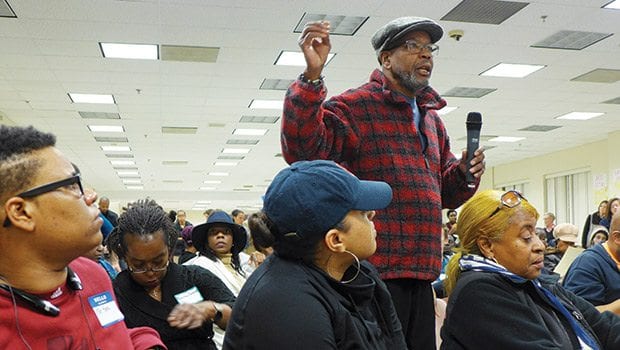Roxbury residents plan for more say in development
Call to gather info, identify voices and look to past

One-hundred and fifty residents gathered at Roxbury Community College last week to identify how they and other community members can take charge of the development projects shaping their neighborhood. At the “Roxbury Planning for Roxbury Residents” meeting last Thursday, attendees looked for ways to increase awareness of upcoming construction projects and ensure community members have a say in the development process. They also brainstormed first steps that can be taken within the next two to three months.
“If we don’t have a cohesive plan, we will be acted upon rather than the actors,” said City Councilor Tito Jackson, co-convener of the meeting. “This is about what is happening in our community, not necessarily for us, but to us.”
Attendees broke into groups to discuss the current situation and generate ideas for actions. They concluded that important next steps were to examine previous planning processes in Roxbury, such as the Roxbury Strategic Master Plan and neighborhood council, as well as identify other community voices, gather information on development projects in the area, organize committees and further spread the word.
Ceasar McDowell, a professor of the practice of community development at MIT, co-convened the meeting with Jackson. Students from McDowell’s class as well as RCC will assist with the process.
Pressing deadlines
Jackson emphasized the need for urgency. “There are individuals planning for the neighborhoods and parcels we’re talking about right now,” he said.
Imagine Boston 2030, the citywide planning initiative, is scheduled to draft strategic and physical visions this spring and Roxbury’s vacant parcels are likely to draw further attention. Roxbury has 352 undeveloped parcels of land and two-thirds of Boston’s undeveloped land lies in Roxbury, Dorchester and Mattapan, Jackson said. But the Roxbury Strategic Master Plan Oversight Committee’s project review powers only extend to nine of these parcels.
One voice
A critical step to having power is being able to present a unified front, Jackson said.
To achieve this, community members must agree on goals and standards for projects, such as the desired level of affordability for housing and what community benefits should entail. With a set of priorities and desires established, residents will better be able to evaluate incoming developers’ plans and present their own criteria.
For instance, some residents may view landscaping as a community benefit, while others may prefer funds be put to community programs, noted Kaira Fox, Roxbury and South End neighborhood liaison.
One hurdle: defining Roxbury. Attendees questioned which demographics need to be represented and in what proportion.
At one table, disagreement arose over whether potentially temporary residents, who might rent for six months then move on, should get the same percentage of representation as those who have lived and invested longer in the community.
On the Web
Roxbury Strategic Master Plan: www.bostonredevelopmentauthority.org/planning/planning-initiatives/roxbury-strategic-master-plan
Information is power
A common occurrence in Roxbury: waking up to discover construction happening on the street outside, without having received any prior notice it would be happening, Jackson said. By show-of-hand, others at the meeting agreed they had had similar experiences.
For too long, residents have not been informed on what is happening in their neighborhood and have not known how to insert themselves in the process to get voices heard before projects are too far along to stop, attendees said.
Development planning is initiated years in advance, but often it is not until the construction starts that people become aware anything was in the works, said Bruce Bickerstaff, former chair of the Roxbury Neighborhood Council.
“We need to know where the tip of the fuse is, not the dynamite,“ Bickerstaff said.
To tackle this problem, several attendees proposed creating a centralized platform for collecting and disseminating information on topics such as land purchases as they occur.
Build on the past
Some attendees warned against reinventing what already exists. They suggested reviewing and updating the Roxbury Strategic Master Plan and reinstating a modified Roxbury Neighborhood Council.
Neighborhood Councils have the power to review projects and weigh in on them before the Boston Redevelopment Authority gives approval.
Another need attendees identified was to broaden awareness of what the Roxbury Strategic Master Plan says. While the plan is available online, not everyone knows to look for it, and even those who would not seek out such information on their own deserve to be involved in Roxbury’s planning, said Aziza Robinson-Goodnight, ACT-SO committee chair for the Boston NAACP.
She suggested displaying information from the plan on boards in public locations.
An additional goal of a planning and organizing body could be to monitor whether developers are following through on promises.
“Time and time again we say, ‘You’re going to do this, this, this in the RFP’ and it never happens,” said Rodney Singleton, Roxbury resident.
Moving forward
As a next step, attendees proposed reaching out to and involving members of neighborhood associations, tenant associations, nonprofits, schools, community development corporations and community centers. They also suggested a door-to-door campaign to inform residents about the new planning efforts.
Organizers passed out sign-up sheets for attendees interested in becoming involved on one of the issue areas — such as governance and decision-making — to connect by email.
Another meeting is planned for January.
“We didn’t come together to begin this process,” reminded Jackson, “we came together to see this process to the end.”






